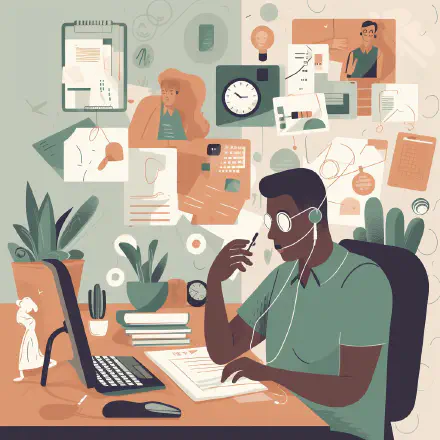
Do you ever find yourself struggling to focus on a task at hand, getting distracted every few minutes? Do you often feel overwhelmed by the sheer amount of work you need to complete, and find it difficult to prioritize your tasks effectively? If so, it’s time to learn about the power of distraction-management in boosting your productivity.
Distractions are everywhere - from social media notifications to email alerts to chatty colleagues. While some distractions might be unavoidable, there are plenty of ways to minimize their impact and improve your focus and productivity. Here are a few tips to get you started:
1. Identify Your Distractions
The first step in managing distractions is recognizing what they are. Take note of the activities, people, and things that distract you from your work. Are you constantly checking your phone for new messages? Do you find it hard to focus when there’s noise around you?
Once you have a clear picture of your distractions, you can start addressing them.
2. Create a Distraction-Free Workspace
Creating a workspace that is free from distractions can help you focus on your work. Try to find a quiet place where you can concentrate, whether it’s a separate room or just a designated corner of your workspace. If you work in an open-plan office, consider wearing noise-cancelling headphones to block out the sound of your colleagues.
Another way to minimize distractions is to keep your workspace organized and tidy. A cluttered desk can be distracting and make it harder to focus on your work.
3. Prioritize Your Tasks
It’s easier to stay focused when you have a clear idea of what you need to accomplish. Make a to-do list each day, prioritizing the most important tasks first. When you complete a task, cross it off your list - this will give you a sense of accomplishment and motivate you to tackle the next task.
4. Use Time-Blocking
Time-blocking is a technique that involves breaking your day into blocks of time, each dedicated to a specific task. This technique can help you stay organized and focused, and prevent distractions from taking over.
For example, if you need to write an article, allocate a specific block of time for research, another for writing, and another for editing. During each block, focus solely on that task and avoid distractions.
5. Take Breaks
Taking breaks throughout the day can help you stay productive and avoid burnout. When you feel yourself getting distracted or losing focus, take a short break to recharge. This could be a quick walk around the block, stretching, or grabbing a snack.
However, it’s crucial to set a time limit for your break and avoid getting sucked into social media or other distractions.
6. Use Distraction-Blocking Apps
Finally, there are several distraction-blocking apps and extensions that can help you stay focused on your work. These tools can block access to certain websites or apps for a set amount of time, preventing you from getting distracted.
Some popular distraction-blocking tools include Freedom, StayFocusd, and Cold Turkey.
By implementing these strategies, you can reclaim control over your workday and boost your productivity. Remember, staying focused and productive requires consistent effort, so be patient and persistent in your distraction-management journey.



